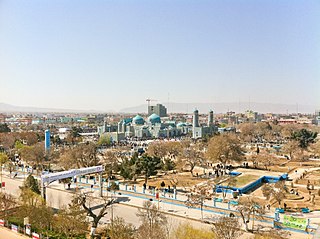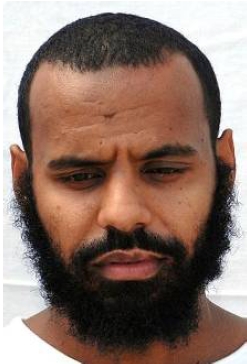Related Research Articles

Abdul Rashid Dostum is an Afghan exiled politician, former Marshal in the Afghan National Army, founder and leader of the political party Junbish-e Milli. Dostum was a major army commander in the communist government during the Soviet–Afghan War, and in 2001 was the key indigenous ally to US Special Forces and the CIA during the campaign to topple the Taliban government. He is one of the most powerful and notorious warlords since the beginning of the Afghan wars, known for siding with winners during different wars.

Mazār-i-Sharīf, also called Mazār-e Sharīf, or just Mazār, is the fourth-largest city of Afghanistan, with a population estimate of 1,000,000 people. It is the capital of Balkh province and is linked by highways with Kunduz in the east, Kabul in the southeast, Herat in the southwest and Termez, Uzbekistan in the north. It is about 55 km (34 mi) from the Uzbek border. The city is also a tourist attraction because of its famous shrines as well as the Islamic and Hellenistic archeological sites. The ancient city of Balkh is also nearby.

The Dasht-i-Leili massacre occurred in December 2001 during the U.S. invasion of Afghanistan when 250 to 2,000 Taliban prisoners were shot and/or suffocated to death in metal shipping containers while being transferred by Junbish-i Milli soldiers under the supervision of forces loyal to General Rashid Dostum from Kunduz to Sheberghan prison in Afghanistan. The site of the graves is believed to be in the Dasht-e Leili desert just west of Sheberghan, in the Jowzjan Province.
Sheberghān or Shaburghān, also spelled Shebirghan and Shibarghan, is the capital city of the Jowzjan Province in northern Afghanistan.

The Northern Alliance, officially known as the United Islamic National Front for the Salvation of Afghanistan, was a military alliance of groups that operated between late 1996 to 2001 after the Islamic Emirate of Afghanistan (Taliban) took over Kabul. The United Front was originally assembled by key leaders of the Islamic State of Afghanistan, particularly president Burhanuddin Rabbani and former Defense Minister Ahmad Shah Massoud. Initially it included mostly Tajiks but by 2000, leaders of other ethnic groups had joined the Northern Alliance. This included Karim Khalili, Abdul Rashid Dostum, Abdullah Abdullah, Mohammad Mohaqiq, Abdul Qadir, Asif Mohseni, Amrullah Saleh and others.

Jamie Doran is an Irish-Scottish independent documentary filmmaker and former BBC producer. He founded the multi award-winning company Clover Films, based in Windsor, in 2008. He is also the Club President of Datchet Village FC, which he founded in 1986.

Afghan Massacre: The Convoy of Death is a 2002 documentary by Irish filmmaker Jamie Doran and Afghan journalist Najibullah Quraishi. It documents alleged war crimes committed by the Junbish-i Milli faction of the Afghan Northern Alliance under General Abdul Rashid Dostum against Taliban fighters. The Taliban fighters, who had surrendered to Dostum's troops after the November 2001 siege of Kunduz, were transported to Sheberghan prison in sealed containers. Human rights groups estimate that hundreds or thousands of them died during and after transit. Afghan Massacre: The Convoy of Death presents testimony from interviewees stating that American military personnel were present at and complicit in some of the mass killings, known as the Dasht-i-Leili massacre.
Mohammed Saghir(also transliterated Mohammed Sanghir) is an elderly Pakistani who was held by the U.S. military in the United States Guantanamo Bay detention camps, in Cuba. His Guantanamo Internment Serial Number was 143. Joint Task Force Guantanamo counter-terrorism analysts estimate he was born in 1952, in Khohestan, Pakistan.

The 1996–2001 Afghan Civil War took place between the Taliban's conquest of Kabul and their establishing of the Islamic Emirate of Afghanistan on 27 September 1996, and the US and UK invasion of Afghanistan on 7 October 2001: a period that was part of the Afghan Civil War that had started in 1989, and also part of the war in Afghanistan that had started in 1978.

Salem Ahmed Hadi Bin Kanad is a citizen of Yemen, who was held in extrajudicial detention in the United States Guantanamo Bay detainment camps, in Cuba. His detainee ID number is 131. Joint Task Force Guantanamo counter-terrorism analysts reports that Hadi was born on January 15, 1976, in Hadhramaut, Yemen.
The Parwan Detention Facility is Afghanistan's main military prison. Situated next to the Bagram Air Base in the Parwan Province of Afghanistan, the prison was built by the U.S. during the George W. Bush administration. The Parwan Detention Facility, which housed foreign and local combatants, was maintained by the Afghan National Army.
Ejaz Ahmad Khan is a citizen of Pakistan who was held in extrajudicial detention in the United States's Guantanamo Bay detention camps, in Cuba.

The siege of Kunduz took place in 2001 during the War in Afghanistan. After the fall of Mazar-i-Sharif on 9 November, the focus of the Northern Alliance advance shifted towards the city of Kunduz, which was the last remaining Taliban stronghold in northern Afghanistan.

The National Islamic Movement of Afghanistan, sometimes called simply Junbish, is a Turkic political party in Afghanistan. Its founder is Marshal Abdul Rashid Dostum who created it in 1992 made from his loyalist remnants from the People's Democratic Party of Afghanistan's communist regime.
General Abdul Majid Rouzi was an Uzbek commander of Arab Descent during the Afghan Civil war. He was allied with the forces of General Abdul Rashid Dostum.
The Battles of Mazar-i-Sharif were a part of the Afghan Civil War and took place in 1997 and 1998 between the forces of Abdul Malik Pahlawan and his Hazara allies, Junbish-e Milli-yi Islami-yi Afghanistan, and the Taliban.
In late 2008, the Department of Defense published a list of the Guantanamo captives who died in custody, were freed, or were repatriated to the custody of another country. The list was drafted on October 8, 2008, and was published on November 26, 2008. Subsequently almost two hundred more captives have been released or transferred, and several more have died in custody.
Hafiz Liaqat Manzoor is a citizen of Pakistan who was held in extrajudicial detention in the United States's Guantanamo Bay detention camps, in Cuba. His Guantanamo Internment Serial Number was 139.

Mullah Noorullah Noori is the current Minister of Borders and Tribal Affairs of the Islamic Emirate of Afghanistan since 7 September 2021. He was also the Taliban's Governor of Balkh Province during their first administration (1996–2001). Noorullah Noori spent more than 12 years in extrajudicial detention in the United States's Guantanamo Bay detention camps, in Cuba. Noori was released from the detention camp on May 31, 2014, in a prisoner exchange that involved Bowe Bergdahl and the Taliban Five, and flown to Qatar.
References
- 1 2 Andy Worthington (February 6, 2009). "The Guantánamo Files: Website Extras (7) – From Sheberghan to Kandahar". Archived from the original on February 17, 2010. Retrieved 2010-04-17.
- ↑ "The Afghan ship-container 'massacre'". BBC News. 2009-07-13. Retrieved 2013-07-07.
US President Barack Obama has said he is looking into the alleged atrocity, amid recent reports that the administration of George W Bush resisted efforts to investigate it fully.
Coordinates: 36°40′01″N65°44′01″E / 36.667°N 65.7336°E